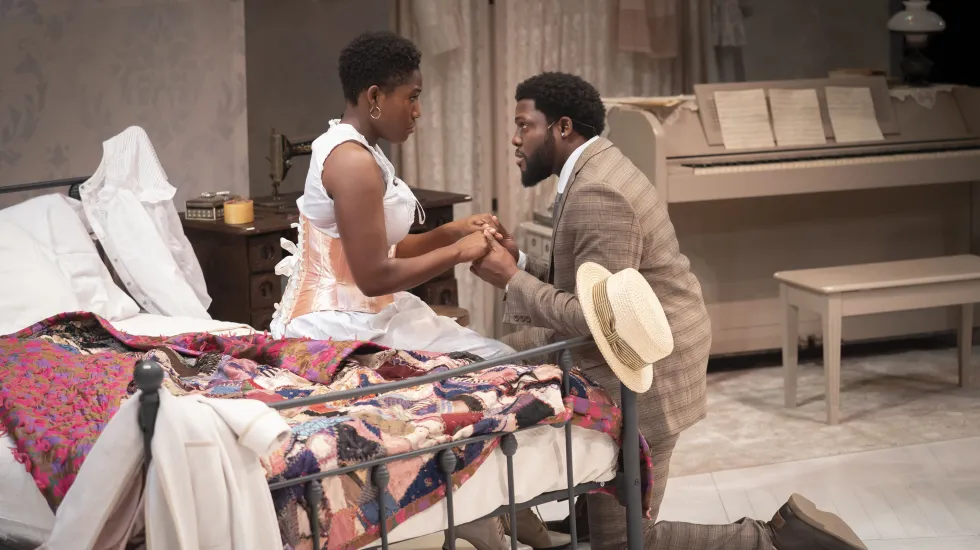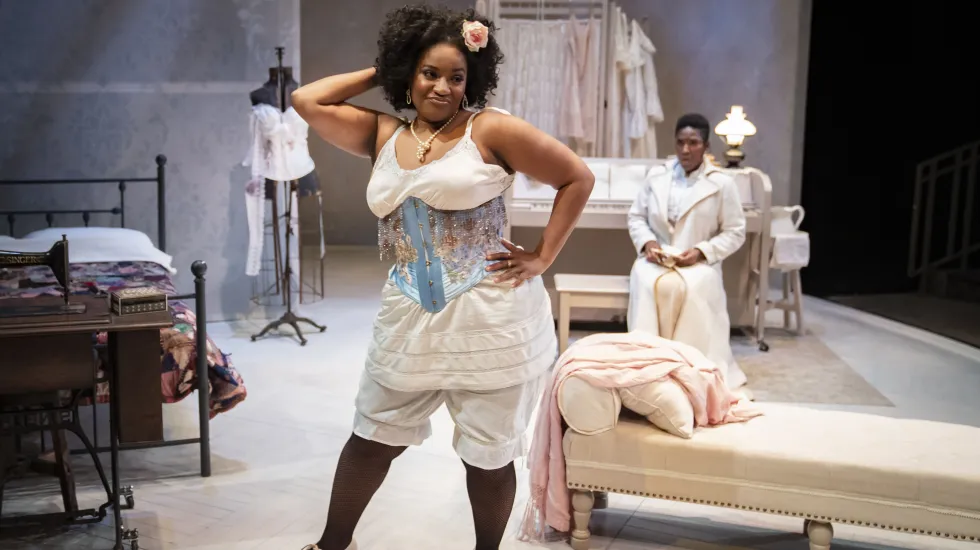
“Intimate Apparel,” now playing at Northlight Theatre, is a unique romantic drama that is sure to leave your heart bursting at the seams. Set in 1905, the play by Lynn Nottage follows Esther, a young, talented Black seamstress who spends her days sewing saucy lingerie to spice up the love lives of wealthy clients, yet spends her own nights alone. Like a Harlequin Romance novel come to life, the play finds every character hemmed in by their circumstances, whether it be race, religion, age, gender or status.
Prim and proper Esther (played with lovey nuance by Mildred Marie Langford) worked her way out of poverty, but at the ripe old age of 35 finds herself a spinster. Gripped with social anxiety and crushing insecurities about her plain appearance, she feels unequipped to woo a suitor in the traditional fashion. Much to her surprise, a handsome stranger begins writing her letters from afar, and she begins to dream about love for the first time.
When: Through May 15
Where: Northlight Theater, North Shore Center for the Performing Arts, 9501 Skokie Blvd., Skokie
Tickets: $30-$89
Run time: 2 hours 30 minutes, with one 15-minute intermission
Info: northlight.org
Yao Dogbe plays a charismatic George, a poor laborer who begins to woo Esther. His honeyed letters whispering of nuptial bliss contrast sharply with his harrowing descriptions of the death and inhumanity he witnesses during his work on building the Panama Canal. As Esther falls sway to his charm, she discovers that love might also exist much closer to home. Enter Mr. Marks (played gently by Sean Fortunato), a Jewish fabric merchant who shares Esther’s love of fine textiles. Though the restrictions of his religion forbid touching a woman who is not his wife, both he and Esther begin to imagine what it might be like to go against the grain in a touching scene where they admire the same piece of silk fabric together.
Every character in the play exists on the margins of society, afraid of breaking conventions, including the triumvirate of Esther’s female friends, Mrs. Dickson, Mayme and Mrs. Van Buren, a stellar ensemble of talent played by Felicia P. Fields, Rashada Dawan and Rebecca Spence, respectively. Mrs. Dickson is the landlady, providing Esther with motherly affection and wisdom borne from the hardest lessons. Mayme is a lady of the evening, all bravado and smiles, who on the surface seems to be Esther’s opposite, but is far more similar than one might imagine. Lastly, Mrs. Van Buren is Esther’s wealthy client, emotionally poor and neglected by her husband. All three provide Esther with invaluable implicit —and at times extremely explicit—wisdom about navigating life as a woman.
The pale, powder-puff pink set design by Scott Penner seems to represent the feminine struggle, the uniformity of the color indirectly speaking to the solidarity of the vulnerability of women in a patriarchal society, no matter their background. The tower in the center is covered with a sheer veil that obscures, creating a dreamlike effect that evokes not only dreams of love, but of a brighter future for those not even yet a generation beyond slavery. Costume designer Raquel Adorno treats the eyes to sumptuous corsets—beautiful underthings taking center stage in private boudoirs, a metaphor for the sanctity and safety of women’s spaces where their authentic selves can be laid bare.

Though the acting is stellar all around, the play has its flaws. A fair amount of content is repetitive, and at a billowy running time of 2 hours and 30 minutes, it could stand to be nipped in at the waist. Overall director Tasia A. Jones has done a fantastic job with the material; however, a choice to occasionally place actors with their backs to the audience is puzzling, especially during Mayme’s intense monologue. The staging robs half of the audience from seeing Dawan’s face as she expertly delivers a devastating truth. The fact that the moment still crackles is a testament to Dawan’s immense talent.
Though the plot is somewhat predictable, the story does linger faintly like perfume on the breeze. The audience is left wondering what might play out between these characters long after the curtain goes down, and wondering what might play out in our own lives if we decided to take that chance. Just like a custom-made corset, “Intimate Apparel” leaves its audience wanting more.








